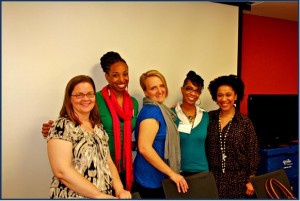 Consider the masses of younger women who showed up at the Texas statehouse before and after Wendy Davis’ pink-shoed filibuster against a bill that would effect devastating restrictions to women’s healthcare. Consider the online organizing carried out by women like Jessica Luther to feed and sustain those orange-shirted activists. Consider the recent panel on Millennials of color and reproductive justice at Netroots Nation.
Consider the masses of younger women who showed up at the Texas statehouse before and after Wendy Davis’ pink-shoed filibuster against a bill that would effect devastating restrictions to women’s healthcare. Consider the online organizing carried out by women like Jessica Luther to feed and sustain those orange-shirted activists. Consider the recent panel on Millennials of color and reproductive justice at Netroots Nation.
Consider Samantha Griffin and the work of the Black Women’s Health Imperative in Washington, D.C. I met Samantha last year (that’s us bookending the pic below!) as part of the Faith and Reproductive Justice Leadership Institute at the Center for American Progress, and she recently did an interview with Sally Steenland, its director.
They began by focusing on younger women and their advocacy for reproductive justice:
We have always known a world where it’s legal for a woman to make choices about her pregnancy and her preparedness to parent, and we don’t want to go back. …
We showed up for Planned Parenthood when it was going to be defunded. The fact that the organization is able to continue and not only provide abortion care but other reproductive services—including contraception and many important screenings—as well is largely because of the activism of Millennial women. We showed up online, we marched, we donated. Planned Parenthood funding went up because of us and because we care. …
 On what sets Millennial women apart and how that strengthens the reproductive justice movement:
On what sets Millennial women apart and how that strengthens the reproductive justice movement:
We’re the most diverse generation that America has seen yet, and that’s only going to continue. We grew up in schools and in communities where we were in touch with people that were not like ourselves.
Many of us know the importance of inclusivity, and … so when we talk about reproductive justice, we’re talking about it in the broadest and truest sense. The right of every woman, in every family to control what their family looks like—if they’re going to parent, when they’re going to parent. We have gone beyond the choice model to include things such as gay marriage. We believe in transgender rights. And I think that’s incredibly valuable for the movement.
This is not only a generational thing, Samantha points out, it’s the mission of the organization for which she works:
The Black Women’s Health Imperative was founded in the concept of reproductive justice. That is our grounding. It’s the idea that black women need to be able to control their bodies, their own wellness, and their own lifestyle—whether that’s sexual health and reproductive rights or something such as chronic diseases.
What we’re doing this year is getting back to that grounding in reproductive justice. We’re going back to the basics. We are specifically focusing on sexual health and reproductive justice as one priority issue area. The other issue area we’re focusing on is lifestyle change. And the two issue areas are working in tandem because as we know, in order to make choices about our families and our reproduction and our sexuality, we need to be in a well and whole state of mind.
And finally, Samantha offers a few comments on the intersection of faith with her work for reproductive justice:
My faith embraces the right of everyone to have pleasure and to also have bodily control over themselves to create relationships and family structures that are best for each of us. So when it comes to reproductive justice, if sex is a good thing, then the product of that is also potentially a good thing. And so whether a woman decides that should be a child, or whether it is intimacy and a relationship, that’s a decision that’s best left up to her and her God. We can’t intrude on that divine relationship. God created us to be sexual and to relate to one other in that intimate way. And that’s a good thing. So how can we shame women for needing to make their own decisions after having sex?
For more of the interview, or to listen to the podcast, head over to the Center for American Progress website.
For more information on the work of the BWHI, click here.












